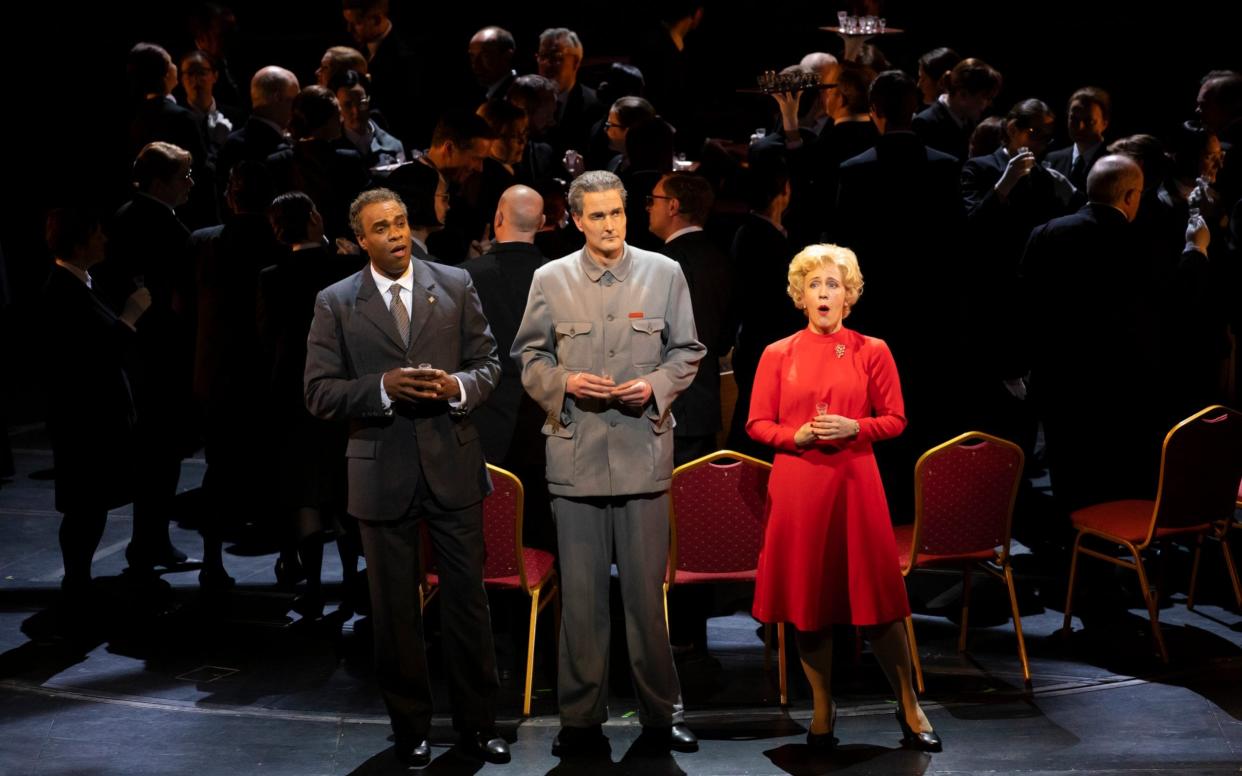Nixon in China, the opera critics loved, engulfed in 'yellow face' row

- Oops!Something went wrong.Please try again later.
With sell-out performances in Scotland last year and a host of four and five-star reviews, Scottish Opera's production of Nixon in China was described as "entrancing" and "gripping" by critics.
But the production has now, 16 months after it was actually on stage, become the centre of a "yellow face" row culminating in Scottish Opera withdrawing it from nomination for a prestigious award and issuing an apology for "inadvertently" causing offence.
The independent judging panel for the South Bank Sky Arts Awards, which nominated the production for its opera award, has now hit back, doubling down on their support of the show and saying that they stand by its original nomination.
Inspired by the former American president Richard Nixon’s official visit to China in 1972, the opera was written by John Adams and premiered at the Houston Grand Opera in 1987.
The production involves a chorus largely made up of singers playing Chinese communist party members, as well as key lead roles for performers playing Chinese politicians of the era.
The fact that most of the cast in Scottish Opera's production were white - with a notable exception that Nixon was played by African-American baritone Eric Greene - was barely remarked upon during the opera’s run last Spring.
Last Wednesday, one London-based composer accused the production of "yellow washing", explaining on Twitter: “It's like blackface, but applied to East and South-East Asian characters [EASA]. It's offensive and dehumanising for ESEA people. Opera folks, please learn about this and do better."
Julian Chou-Lambert added that it was "not good enough" that out of six lead Chinese roles, just one is of ESEA descent.
He went on to say, "I don't see any ESEA heritage people in the backstage/creative team" even though it is an opera set in China.
Mr Chou-Lambert’s remarks were picked up by Sarah Owen, the Labour MP for Luton North, who questioned why the production received taxpayer funding when it involved "so few" ESEA people.
She also claimed that cast members had "exaggerated winged eye make-up", saying this was "classic yellow face".
The campaign group British East and South East Asians Working in the Theatre and Screen Industry then weighed into the row, saying it was "very concerned" to hear about "both yellowface make-up and whitewashing" in the performance.
They said the application of make-up on white performers to make them look more East Asian is a "degrading form of cultural appropriation that dehumanises those it claims to represent", it said.

In a statement on Friday, Scottish Opera addressed the "yellow face" attacks, saying they "intended to portray the character of Chairman Mao as old and in ill-health and in no way were we trying to change his ethnicity".
But they nonetheless said they will withdraw their nomination of the show "as we do not wish to win an award for something that has inadvertently caused offence".
Sky Arts also apologised for "the offence caused by the nomination”, saying they supported the withdrawal.
But some have pointed out that demands to cast the opera entirely from those of ESEA descent is simply "impractical" and will sound a death knell for productions of the opera.
"This controversy will make it very hard to stage this opera in the West because it requires a large Chinese cast and if they all have to be from that part of the world it is just too difficult to find singers of the quality you need to stage an opera in a country the other side of the world from China," one source said.
Describing Scottish Opera’s announcement as "knee jerk", they added: "It is a massive failure to stand behind the production and defend them when a tiny minority of people complain over a year later."
The South Bank Show Awards Panel said they were "saddened by the withdrawal of Scottish Opera’s nomination for its 2021 opera award and stands by its original decision to nominate them".
The South Bank Show Awards, which have been given annually since 1996, recognise British achievement in the arts and have a wide range of categories including literature, theatre, film, opera, visual art, dance, comedy, classical and pop music.
The awards originated with the long-running programme The South Bank Show.
Written and presented with the veteran BBC broadcaster Melvyn Bragg, it started in 1978 and was the longest continuously running arts show on UK television.
After its run on ITV ended in 2010, a new version began on Sky Arts two years later.

